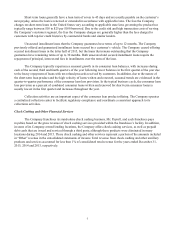Cash America 2015 Annual Report Download - page 21
Download and view the complete annual report
Please find page 21 of the 2015 Cash America annual report below. You can navigate through the pages in the report by either clicking on the pages listed below, or by using the keyword search tool below to find specific information within the annual report.
the Consent Order requires the Company to perform a formal consumer protection compliance risk review before
introducing or implementing new or changed products or services. This requirement could result in additional delay
or cost when introducing or implementing new or changed products or services, or a decision not to proceed with
such initiatives. In addition, Enova is also subject to the Consent Order because it was part of the Company when
the Consent Order was issued. The Company cannot assure that Enova will continue to comply with the Consent
Order now that it is a separate publicly traded company. If Enova does not comply with the consent order, the
Company could be held liable for Enova’s noncompliance. See “Risk Factors Related to the Enova Spin-off—In
connection with the Enova Spin-off, Enova and the Company have agreed to indemnify each other for certain
liabilities; if the Company is required to act on these indemnities to Enova, it may need to divert cash to meet those
obligations, and Enova’s indemnity could be insufficient or Enova could be unable to satisfy its indemnification
obligations” for information regarding risks related to indemnification by Enova. Any noncompliance with the
Consent Order or similar orders or agreements from other regulators could lead to further regulatory penalties and
could have a Material Adverse Effect.
The adoption of new laws or regulations or adverse changes in, or the interpretation or enforcement of, existing
laws or regulations affecting the Company’s products and services could have a Material Adverse Effect.
Governments at the national, state and local levels, may seek to impose new laws, regulatory restrictions or
licensing requirements that affect the Company’s products or services it offers, the terms on which it may offer
them, and the disclosure, compliance and reporting obligations it must fulfill in connection with its business. They
may also interpret or enforce existing requirements in new ways that could restrict the Company’s ability to
continue its current methods of operation or to expand operations, impose significant additional compliance costs,
and could have a Material Adverse Effect. In some cases these measures could even directly prohibit some or all of
the Company’s current business activities in certain jurisdictions, or render them unprofitable and/or impractical to
continue.
In July 2015, the Department of Defense published a finalized set of new rules under the Military Lending
Act. The Military Lending Act (and rules previously adopted thereunder) has previously restricted the Company
from offering its short-term unsecured credit products to members of the military or their dependents because none
of the Company’s short-term unsecured credit products carry a military annual percentage rate of 36% or less. The
new rule expands the scope of the credit products covered by the Military Lending Act to include certain non-
purchase money loans secured by personal property or vehicles and certain unsecured installment loan products to
the extent any of such products have a military annual percentage rate greater than 36%. Because none of the
Company’s pawn loans or secured or unsecured installment loans have a military annual percentage rate of 36% or
less, once the new rule takes effect, the Company may not be able to offer any of its current credit products
(including pawn loans) to members of the military or their dependents. The rules under the Military Lending Act
contain various disclosure requirements, limitations on renewals and refinancing and other restrictions, including
restrictions on the use of prepayment penalties, arbitration provisions and certain waivers of rights. The rule
provides that a lender is subject to fines and other penalties if it extends credit to a member of the military or a
military dependent on terms prohibited by the rule. The new rule does provide a safe harbor for a lender if it verifies
a potential borrower’s military status before extending credit by checking the Department of Defense’s database or a
database of a national credit reporting agency that provides military status information. As to the Company’s pawn
loan and longer-term credit products, compliance with the new rule is required by October 3, 2016. Compliance
with the new rule and coordinating with a safe harbor database could be complex and increase compliance costs.
The Company is still assessing the potential impact of these new rules on its pawn business.
Additionally, the CFPB has also announced that it has been conducting a review of the short-term small
dollar loan industry, which includes a review of payday loans, and has indicated that its “findings raised substantial
consumerprotectionconcerns”relatedtothesustaineduseofpaydayloans.OnMarch26,2015,theCFPB
announced that it is considering proposing rules that would require lenders to take steps to make sure consumers can
repay their loans and would also restrict lenders from attempting to “collect payment from a consumers’ bank
account in ways that tend to rack up excessive fees.” The CFPB has indicated that such rules would apply to payday
loans, vehicle title loans and high-cost installment loans, among other consumer loans, and may impose certain
17
























